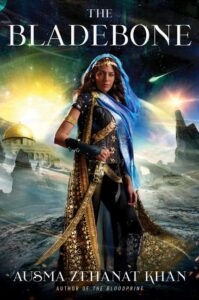“The Khorasan Archives” Series with Ausma Zehanat Khan

By Amani Salahudeen
September/October 2022
Ausma Zehanat Khan is a crime-fiction and fantasy writer. Her recent book “The Bladebone,” published in 2020, is the final volume in her “The Khorasan Archives” fantasy quartet.
“The Bladebone” contains an epic war scene, and Khan goes into depth about why it’s one of her favorite scenes. The series, inspired by her Pashtun background, also incorporates Islam. Khan says, “I offer writing advice with the caveat that you must find what works for you as an individual. But what I’ve found helpful is to read widely not only for pleasure, but also to study craft and technique. There’s so much to be learned about pacing, character development and the art of storytelling by studying those writers who do it well.”

Worldbuilding, a major aspect of fantasy novels, is the process of creating a fictional world. Khan talks about her process and gives advice to other fantasy writers on how to improve writing an epic fantasy book series. She also uses the Dajjal in her stories, an entity derived from Islam and known for having only one eye.
The worldbuilding in her four-volume series presents a rich and immersive world that is perfect for fans of S.A. Chakraborty’s “The Daevabad” series.
Amani: What inspired the One-Eyed Preacher?
Ausma: The One-Eyed Preacher stands for any tyrant who governs without the consent of the governed and, in his case, someone who tolerates no dissent on how scripture may be interpreted. He’s clearly an ideologue. I thought in the first instance of Taliban leader Mullah Omar, but also of the Dajjal, a figure in the Islamic tradition.
Amani: Do you have any writing advice for those who want to be writers?
Ausma: I offer writing advice with the caveat that you must find what works for you as an individual. But what I’ve found helpful is to read widely not only for pleasure, but also to study craft and technique. There’s so much to be learned about pacing, character development and the art of storytelling by studying those writers who do it well. And I also point out that the more you practice, the better you get. My first drafts are far from perfect, but I get them down and then I continue to edit and refine.
Amani: Who was the easiest and hardest character to write?
Ausma: Arian and Sinnia were easier to write because I had a very clear sense of their personalities, background, and story arcs from “The Bloodprint” all the way through to “The Bladebone.” I knew their histories well, and with Arian in particular I was writing very close to my own background, history and heritage, all of which allowed me a fullness of expression that maybe other characters did not.
The hardest characters to write were Rukh, the Black Khan, and Ilea, the High Companion of Hira. With Rukh, I didn’t know him inside out from the beginning, so there were shades of him that I continued to explore throughout the series. I realized in the end that this was because he has an ambivalent nature, and that’s never easy to pin down. But it also allows for a great deal of creative freedom. With Ilea, I had to keep asking myself what she wanted, as she had some forward progression from the first book to the final book that I wasn’t entirely expecting.
Amani: You mentioned that “Call the stars, Rukh!” is your favorite line. Why?
Ausma: The line is actually from my favorite scene in “The Bladebone.” It’s said by Arsalan, the Commander of the Zhayedan, the Black Khan’s army. The Zhayedan are defending the capital of Ashfall from two besieging armies. The city is on the brink of collapse, but the Zhayedan are indomitable and battle on, led by Arsalan — a warrior whose skills and commitment to his people are unparalleled.
Arsalan is a very straightforward character, the Black Khan’s closest friend and confidant. In this scene, a battle rages all around them and the city’s fate seems hopeless. But he continuously encourages Rukh (aka the Black Khan) to make full use of his gifts and power. His faith in Rukh, who is a very dubious character, is what gives Rukh faith in himself, and so you have this moment of quiet intimacy between these two men while chaos rages around them. That was hard to pull off, but it felt beautiful and true to me.
Amani: What inspired you to write the Khorasan Archives?
Ausma: The story holds that this is the oldest written record of the Quran, compiled by Caliph Uthman, the third caliph. He was assassinated while reading it, and it is said that his blood stains its pages. I was in the presence of a bloodstained manuscript — the Bloodprint, in other words. For those who are unfamiliar with my work, “The Bloodprint” is the first book in “The Khorasan Archives.”
I wanted to capture that sense of reverence in the presence of the written word and also that sense of mourning — the idea that a faith community was still mourning the death of this revered figure. And in the presence of his bloodstained Quran, we were deeply moved.
Amani: What is one thing you hope readers take away from this?
Ausma: I hope readers come away from all my books with a greater sense of curiosity about the world and a greater empathy for histories, traditions and communities that are different from their own.
Khan is currently working on “Blackwater Falls,” a mystery that features the Muslim detective Inaya Rahman. This book is slated for publication on November 1, 2022. Follow Khan on Instagram and Twitter @askhanbooks to keep up with her adventures, and books.
Amani Salahudeen, has a B.A. in journalism and professional writing from The College of New Jersey and is currently pursuing a master’s in English Education at Western Governor’s University.
Tell us what you thought by joining our Facebook community. You can also send comments and story pitches to horizons@isna.net. Islamic Horizons does not publish unsolicited material.
